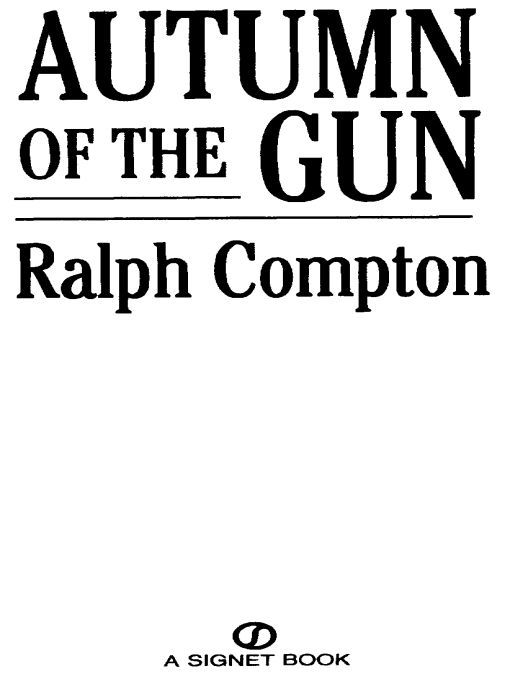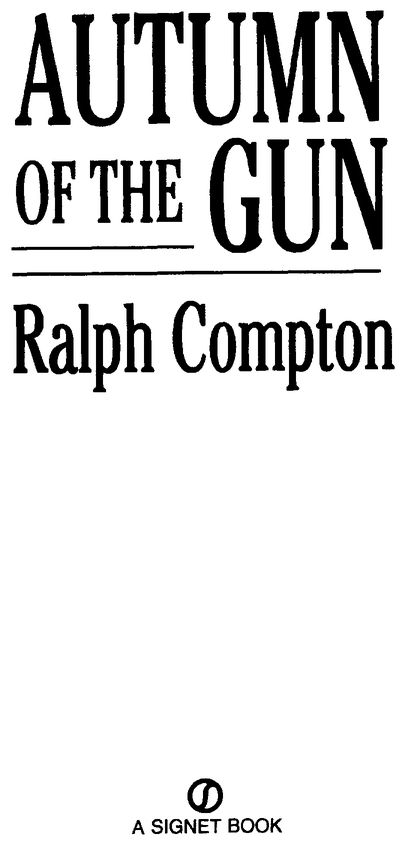Autumn of the Gun
Authors: Ralph Compton


Table of Contents
Â
A GUNFIGHTER GROWS OLDER
It had happened beforeâso many times before. Now Nathan decided to speed up what was going to happen anyway. He walked to the man's table and said, “You've been taking my measure ever since I came in. Do I know you?”
The stranger laughed. “I doubt it. But I know you. You're Nathan Stone, the killer.”
“I'm Nathan Stone,” Nathan replied coldly.
“What do you want of me?”
“I'm Mitch Sowell, and I'm callin' you out. I'll meet you on the street.”
“I have no fight with you,” Nathan said.
“Oh, but you do,” Sowell said. “You have a reputation, and I aim to fight you for it.”
How many more times would he have to do this? Nathan wondered as he followed Sowell out of the saloon. How many more times would he have to kill before he died ... ?

SIGNET
Published by New American Library, a division of Penguin Group (USA) Inc., 375 Hudson Street, New York, New York 10014, U.S.A.
Penguin Books Ltd, 80 Strand, London WC2R ORL, England Penguin Books Australia Ltd, 250 Camberwell Road, Camberwell, Victoria 3124, Australia Penguin Books Canada Ltd, 10 Alcorn Avenue, Toronto, Ontario, Canada M4V 3B2 Penguin Books (N.Z.) Ltd, Cnr Rosedale and Airborne Roads, Albany, Auckland 1310, New Zealand
Â
Penguin Books Ltd, Registered Offices: 80 Strand, London WC2R ORL, England
Â
First published by Signet, an imprint of New American Library, a division of Penguin Group (USA) Inc.
Â
First Printing, December
Â
Copyright © Ralph Compton, 1996All rights reserved
 REGISTERED TRADEMARKâMARCA REGISTRADA
REGISTERED TRADEMARKâMARCA REGISTRADAeISBN : 978-1-101-12727-8
Â
Â
Without limiting the rights under copyright reserved above, no part of this publication may be reproduced, stored in or introduced into a retrieval system, or transmitted, in any form, or by any means (electronic, mechanical, photocopying, recording, or otherwise), without the prior written permission of both the copyright owner and the above publisher of this book.
Â
PUBLISHER'S NOTE
This is a work of fiction. Names, characters, places, and incidents either are the product of the author's imagination or are used fictitiously, and any resemblance to actual persons, living or dead, business establishments, events, or locales is entirely coincidental.
Â
BOOKS ARE AVAILABLE AT QUANTITY DISCOUNTS WHEN USED TO PROMOTE PRODUCTS OR SERVICES. FOR INFORMATION PLEASE WRITE TO PREMIUM MARKETING DIVISION, PENGUIN GROUP (USA) INC.. 375 HUDSON STREET. NEW YORK, NEW YORK 10014.
Â
Â
The scanning, uploading and distribution of this book via the Internet or via any other means without the permission of the publisher is illegal and punishable by law. Please purchase only authorized electronic editions, and do not participate in or encourage electronic piracy of copyrighted materials. Your support of the author's rights is appreciated.
“Nathan Stone, someday, in some town on the frontier, you'll die with your boots on, going against impossible odds, for what you believe is right.”
âfrom
The Killing Season
The Killing Season
PROLOGUE
Southern Arizona Territory April 18, 1877“Yonder he is,” Tasby shouted. “Git him!”
Nathan Stone plunged headlong back into the thicket from which he had just emerged, the shackles on his wrists impeding his progress. Lead whipped through the foliage above his head. Nathan wondered where his dog, Empty, was. While the hound had aided in his escape from Tasby and Dossâthe men delivering Nathan to Yuma territorial prisonâNathan was now on his own. He was afoot, wounded, his wrists manacled, half starved, and without a weapon. When the firing ceased, he crept deeper into the thicket. Nearing the end of his second day as a fugitive, having had no food since the morning of his escape, there was weakness in his body and dizziness in his head. He could hear the voices of his pursuers, and they sounded far away.
“He's in there, by God, an' he ain't armed. We got him now.”
Nathan Stone lay still, overcome by weakness. Sundown was two hours away, but if he evaded them until then, what would it avail him? By morning, weak from hunger and loss of blood, he would be at their mercy. As he lay there, his mind drifted back over the years. Again it was 1866, and following his release from a Yankee prison, Nathan Stone had returned to find his father, mother, and sister dead, murdered by renegades. On their graves, Nathan had taken a blood oath, vowing to track down and kill the seven renegades to the last man. The killers had fled west, and for seven long years, Nathan had ridden a vengeance trail. When the last of the seven were dead, Nathan Stone had the reputation of a fast gun, the name of a killer. He had tried to settle down, distinguishing himself as a telegrapher and troubleshooter for the railroads. He took for his wife a young woman he had rescued from a band of renegades in Indian Territory, only to have the outlaws abduct the girl and brutally murder her. After taking his vengeanceâgunning down the outlawsâNathan had given up his position with the railroad and become a drifter.
But Nathan Stone had been unable to escape his reputation as a fast draw. Wherever he went, he had been forced to live by the gun. When Texas Ranger Captain Sage Jennings had been shot in the back from ambush, Nathan had again ridden the vengeance trail, killing the outlaw who had murdered his friend. He had been stalked and ambushed by a bloodthirsty female whose gun-slinging brother he had been forced to shoot, while a price had been put on his head by the wealthy family of a renegade he had killed in Missouri.
Finally, Nathan's mind drifted back to that dark day in Pueblo, Colorado, where his friend, Harley Stafford, lay near death. Nathan had become involved with Vivian, Harley's sister, and his ensuing friendship with Harley had gotten him a position with the railroad. But Harley had been gunned down by outlaws during a train robbery, and again Nathan Stone had taken to the vengeance trail. Leaving Vivian with the critically wounded Harley, Nathan had taken the trail of the outlaws, tracking them to southern Arizona Territory.
Reaching a town, Nathan had discovered too late that it was inhabited entirely by outlaws, including the judge and sheriff. This time even Nathan's fast draw couldn't save him. He had been forced into a gunfight, charged with murder, and sentenced to hard labor. In chains, he had fought with and killed a brutal guard, and his punishment was more terrible than anything he could have imagined. To his horror, he was being sent to the territorial prison at Yuma as part of a profitable scheme devised by crooked officials at the prison and the outlaw Judge Ponder. For ten thousand dollars, an inmate at Yuma would be allowed to “escape.” The prison would report the escapee had been captured, but the man actually being returned to Yuma would be Nathan Stone.
Judge Ponder had selected Doss and Tasby to deliver Nathan to Yuma territorial prison, and on April 15, 1877, the trio had ridden west. One morning beside the Gila River, when they had been about to resume their journey, Nathan had made his move. Empty, the hound, had attacked one of his captors, while Nathan had gone after the other. His hands still manacled, Nathan had escaped by leaping into the river. Fearing the wrath of Judge Ponder, Tasby and Doss had not given up the chase, and now they were closing in.
Hearing a rustling of leaves, Nathan was about to struggle to his feet, but to his relief, he saw only his faithful hound. Tasby and Doss had taken to shooting at the dog, and since they were mounted, there was little Empty could do except avoid them. But the hated duo had dismounted. Counting on Nathan being wounded, weak, and manacled, they were pursuing him into the thicket. Empty stood beside Nathan, his teeth bared, and the instant one of the searchers appeared, the hound was on him in a fury. When Doss dropped the Colt, Nathan seized it. Weak as he was, he needed both hands, but he shot Doss through the head. Nathan went belly down, and when Tasby fired, his first shot missed. He had no chance for another, for Nathan shot him dead.
“Old son,” said Nathan, struggling to his knees, “if it wasn't for you ...”
Empty sat there watching him as Nathan searched both the dead men. With a sigh of relief, he found the key to the cruel manacles and freed his hands.
“Come on,” Nathan said. “First thing we do is find the horses the varmints was ridin' and fix us some grub.”
Nathan took the Colts and gun rigs from both the dead men, and when he found their saddled horses, there was a Winchester in each saddle boot. He went through the saddlebags, finding bacon, coffee beans, hard tack, and most of a bottle of whiskey. With trembling hands, he started a fire, filled the blackened coffeepot at the river, and hacked off chunks of bacon. Sharing the bacon with Empty, he ate it half raw, drinking the coffee right from the pot. His hunger satisfied, he removed his muddy shirt and examined his wound. It was clean; the lead had missed the bone, and there appeared to be no infection. He heated some water in the coffeepot, cleansed the wound, and, after dousing it with some of the whiskey, bound it with a piece of a shirt from one of the dead men's saddlebags. Nathan then mounted one of the horses and, leading the other, rode upriver until he found his own horse where his pursuers had picketed it. The grulla nickered as Nathan picketed the other two horses alongside it.
“We'll rest a day or two. Empty,” said Nathan, “and allow this wound some time to heal. Then we have some unfinished business with Judge Ponder, Sheriff Hondo, and the rest of those coyotes in that outlaw town.”
Â
Other books
Forever in Darkness (novella) (Order of the Blade #4) by Rowe, Stephanie
Touch of Steel: A Novel of the Clockwork Agents by Cross, Kate
Bloodcurdling Tales of Horror and the Macabre by H.P. Lovecraft
Pursuing Lord Pascal by Anna Campbell
Fair Blows the Wind (1978) by L'amour, Louis - Talon-Chantry
Heart of the Raven by Susan Crosby
Mitchell Smith by Daydreams
Third Strike by Philip R. Craig
14th Deadly Sin: (Women’s Murder Club 14) by James Patterson
T*Witches: The Witch Hunters by Reisfeld, Randi, Gilmour, H.B.